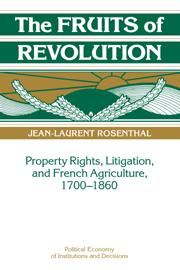Book contents
- Frontmatter
- Contents
- List of tables, figures, and maps
- Series editors' preface
- Preface
- 1 Introduction
- PART I HISTORY AND ECONOMICS
- PART II DRAINAGE AND IRRIGATION
- PART III PROPERTY RIGHTS AND LITIGATION UNDER ABSOLUTISM
- Appendix 1 Wages, land prices, and interest rates
- Appendix 2 Estimating rates of return
- Appendix 3 Theoretical proofs
- Bibliography
- Index
1 - Introduction
Published online by Cambridge University Press: 27 March 2010
- Frontmatter
- Contents
- List of tables, figures, and maps
- Series editors' preface
- Preface
- 1 Introduction
- PART I HISTORY AND ECONOMICS
- PART II DRAINAGE AND IRRIGATION
- PART III PROPERTY RIGHTS AND LITIGATION UNDER ABSOLUTISM
- Appendix 1 Wages, land prices, and interest rates
- Appendix 2 Estimating rates of return
- Appendix 3 Theoretical proofs
- Bibliography
- Index
Summary
The Revolution of 1789 was once seen as a watershed; it had, some argued, abruptly transformed France from a backward feudal society into a modern, progressive bourgeois and capitalistic system. This perspective was based on the premise that the Revolution brought about dramatic social and economic change. Yet what was once seen as the birth of modern France is now sometimes described as a bloody struggle for power. The Revolution's social transformation is considered to have been mere redistribution within a now more widely defined elite.
The Revolution coincided with, and was fueled by, the first major harvest crisis in nearly forty years. Riots broke out, possibly because the government was expected to provide relief from the crisis when in fact it lacked both the will and the resources to act. More generally, it was long argued that the Revolution occurred at the end of forty years of failed reform – in areas as wide ranging as agriculture, trade, the judiciary, and taxation. The Old Regime appeared weighed down by inefficient institutions that the state could not alter. In contrast, some recent scholarship has shone a more favorable light on the economic performance of absolutist France. The strongest debate, perhaps, rages over two questions relating to agricultural policy and performance. First, to what extent did institutions curtail increases in agricultural output and productivity in the eighteenth century? Second, to what extent did Revolutionary reforms contribute to the agricultural development of the nineteenth century?
This book examines the importance of the economic reforms of the Revolution by analyzing the role of institutions in determining investment in water control – irrigation and drainage of marshes – both before and after the Revolution.
- Type
- Chapter
- Information
- The Fruits of RevolutionProperty Rights, Litigation and French Agriculture, 1700–1860, pp. 1 - 6Publisher: Cambridge University PressPrint publication year: 1992



